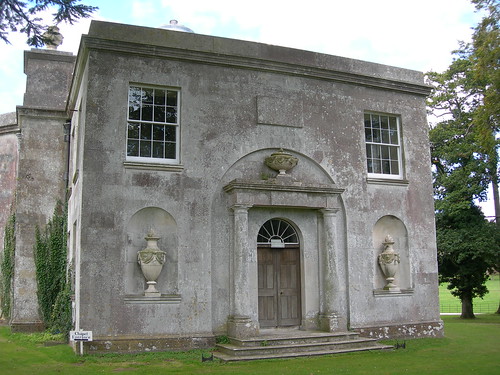Lulworth Castle

Lulworth Castle in Dorset bears the distinction of owning the first free-standing Catholic chapel in post-Reformation England.
The estate (sans castle) was first bought in 1575 by Thomas Howard, son of the 2nd Duke of Norfolk, who was made Viscount of Bindon by Queen Elizabeth. The grounds were home to former Bindon Abbey, the Cistercian monastery seized during the dissolution over two decades previous. Bindon Abbey had dated back to 1149, surviving 400 years until destroyed in 1539, most of its stones removed and used to build up Henrician coastal defense castles nearby. (It also made a brief appearance in Thomas Hardy's novel Tess of the D'Urbervilles.)

Ruins of Bindon Abbey
Upon Howard's death, the property went to his brother Henry, recorded by history as being somewhat dissolute. His brother Thomas inherited the estate after him, and built a hunting lodge meant to entertain royal hunting parties in the country: the present Lulworth Castle.
Humphrey Weld, a recent Catholic convert, purchased the property from Thomas Howard in 1641, and the Welds have since owned the mock castle up to the present day. The recusants regularly hid mission priests in their home, who said secret Masses there. The Welds opened their castle to Royalist forces during the Civil Wars, and suffered pillaging by Parliamentarians in 1644. It was only after the Restoration that the Welds could refurnish Lulworth.
Humphrey Weld was nearly bankrupted by recusancy fines. When penal taxation was abolished in 1725, his grandson was able to begin renovation of the estate into a grand country manse.

The Chapel of St. Mary's, built in the Georgian style by architect John Tasker
In 1786, the squire Thomas Weld decided to build a freestanding chapel, while holding it out to the world as a mausoleum. After King George III and Queen Charlotte visited Lulworth in 1789, the king is said to have declared, in those more liberal times, "Build a family mausoleum, and you can furnish the inside as a Catholic chapel if you wish." That is precisely what Weld did, and Masses were thenceforward celebrated openly on the estate.
It would be two years before England passed a law entitling all Catholics to celebrate Mass openly, ending nearly 250 years of legal suppression of the Holy Sacrifice. Interestingly, over on the continent, the same year saw the outlawing of all non-juring Catholic priests from saying the Mass openly in France.
Masses are held to this day at Lulworth, and the place also serves as host to weddings, and other formal and informal functions.

Lulworth Castle dining room

<< Home